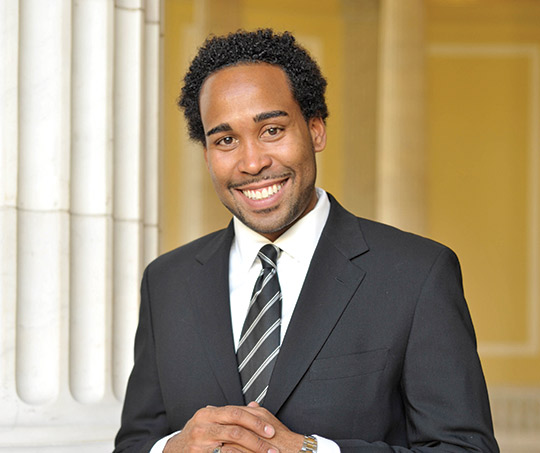His Assignment: Help Close the Gap
Alumni Focus: David Johns (M.A. '06) has spent his life thinking about how to improve educational outcomes for African Americans. Now that's his job -- at the White House.
“African Americans are not thought to value achievement, and when they do achieve, it’s seen as the exception,” says David Johns (M.A. ’06). “We have the opportunity to disrupt those assumptions.”
No one has a better opportunity than Johns, 31, who this past February was appointed Executive Director of the White House Initiative on Educational Excellence for African Americans. Created by executive order, the initiative coordinates efforts among federal agencies and community and corporate partners to produce a more effective continuum of education for African Americans, from cradle to post-college career.
“I’ve been preparing for this job my entire life,” Johns says.
Johns was raised by his mother in the predominantly minority Los Angeles suburb of Inglewood. As a teenager, he rode the bus for an hour each way to attend a charter school. After teaching kindergarten and third grade in New York City at The School at Columbia, he came to TC to study classroom and community dynamics. But along the way, Johns discovered the world of education policy through sociology courses taught by Aaron Pallas, and after graduating, he headed to Washington, D.C., as a Congressional Black Caucus Foundation Fellow.
“I came to Washington to make a more systemic impact,” he says. “It’s important to find ways to scale-up best practices, using policy as a tool.”
Johns worked as an aide to Congressman Charles Rangel and then became Senior Policy Advisor to the Senate Committee on Health, Education, Labor and Pensions. The committee’s chair, Senator Edward Kennedy, had played a key role in the passage of the federal No Child Left Behind Act (NCLB), and Johns shared his hopes that the legislation would narrow the nation’s education achievement gap. Today he acknowledges the Act’s shortcomings, but believes that by disaggregating test-score data by race and income-level, NCLB forced school districts to stop hiding behind overall performance.
“By shining a bright light on the disaggregated data, we’ve been able to have a more thoughtful conversation on under-achievement among African-American students,” he says.
In his new post, Johns looks to improve the quality of programs for African Americans while also expanding access to educational offerings. He envisions an effort that begins with prenatal programs to teach parents about the intentional development of literacy and numeracy skills among the very young. In K-12, his goals include increasing the number of well-prepared teachers and administrators, encouraging more public-private partnerships, improving school safety and supporting community-based programs that develop well-rounded students. He also wants to help African-American students identify institutions and programs that best fit their needs.
But perhaps nearest to his heart is a broader goal: to reframe the narrative around educational excellence, especially for African-American boys, whom he says are too often stereotyped as disinterested in learning or academic achievement.
“Black masculinity and black masculine identity are social constructs,” he says. “History and sociology are ways to understand how black men like James Baldwin and Richard Wright have used those constructs to offer reimagined understandings of the very complex and complicated social beings we are.”
Achieving these goals will be a highly political process, and Johns certainly has the right resume. During the 2012 presidential election, as the Obama campaign’s policy and research director, he spent nine months in the swing state of Nevada, talking to voters about their concerns and spreading the word about the administration’s programs.
“My challenge was to communicate the administration’s investments, outside the D.C. bubble,” he says.
On election night, he kept vigil at polling places in North Las Vegas, urging voters to have patience as they waited to cast their ballots. Obama won Nevada by six percentage points.
“David’s enthusiasm is infectious,” says Pallas of his former student. “His dual orientation to scholarship and activism make him an excellent choice to head this new initiative.”
Johns knows he will need to call on both of those skills. “There’s still so much work to be done,” he says.
Published Thursday, Jun. 27, 2013
